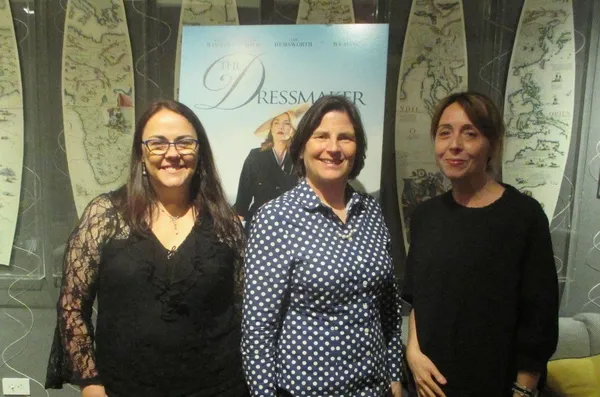 |
| Jocelyn Moorhouse with Sue Maslin and Anne-Katrin Titze, on Grey Gardens: "Definitely. I was inspired by that." Photo: Anne-Katrin Titze |
Kate Winslet and Judy Davis working together, Friedrich Dürrenmatt's The Visit and Jack Nicholson in Sean Penn's The Pledge, Sergio Leone spaghetti westerns, Clint Eastwood's Unforgiven, Albert Maysles and David Maysles' Grey Gardens - Jocelyn Moorhouse, director of A Thousand Acres (Michelle Pfeiffer, Jessica Lange, Jennifer Jason Leigh, Jason Robards, Colin Firth), and Proof (Hugo Weaving, Geneviève Picot, Russell Crowe) and The Dressmaker producer Sue Maslin, who reunited with novelist Rosalie Ham, discuss cinematic links and small-town logistics.
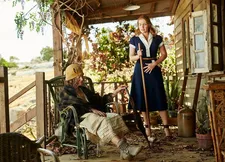 |
| Molly (Judy Davis) and Tilly (Kate Winslet), the Dunnages: "You can just see these two great actresses at the height of their power." |
"If the dream, according to the interpretation, represents a wish fulfilled, what is the cause of the peculiar and unfamiliar manner in which this fulfillment is expressed?" Sigmund Freud asks in The Interpretation Of Dreams. The Dressmaker unfolds not unlike a nightly visitation, concerned with revenge, justice, forgiveness and condemnation.
Kate Winslet plays Tilly, a couture seamstress returning from Paris to the middle-of-nowhere-Australia spot which, many years ago, as a child, she had been expelled from. Her mother, Molly (Judy Davis), has become a recluse and the town's meanies still rule with their bitterness. The tone fluctuates, as it does in a vibrant nightmare, where love and loss readily go hand in glove.
Anne-Katrin Titze: One of the funniest things about this town was that it's such a small town and there are so many people. They just keep coming. The absurdity of a tiny town and all those people living there.
Sue Maslin: That's Australia! I grew up in this little town.
_225.webp) |
| Teddy McSwiney (Liam Hemsworth) with Tilly: "It's a moral fable." |
Jocelyn Moorhouse: A similar town!
SM: Not this town. It's a fictional town [Dungatar], but little towns like that don't have any people that actually live right in the town. They live on the properties around.
AKT: Judy Davis is fantastic! At first I didn't even recognise her. She is so beautiful and at the beginning when we see Molly …
JM: Well, we covered her in a lot of dirt and made her look terrible. And she wanted to have a bad tooth. But you know, I think she is such a beautiful woman that even covered in dirt, you just … I just fell in love with her as a director. I just loved her through the camera. What a face! She is so expressive.
AKT: I loved that you kept her in these clothes. She is not one of them.
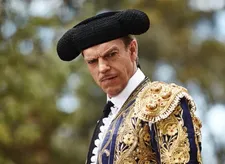 |
| Hugo Weaving as Sergeant Farrat: "They're not actually based on actual people but those types of characters are in every little town all over the world." |
JM: She resists being changed.
AKT: Friedrich Dürrenmatt?
JM: Say that again?
AKT: Friedrich Dürrenmatt, the Swiss dramatist wrote a play called The Visit. It was made into a film with Jack Nicholson [The Pledge].
JM: Oh?
AKT: It's a Swiss play about an old lady who returns to the town where she grew up and takes revenge.
JM: Really?
SM: Wow!
AKT: While watching your film, I thought that it was a version of The Visit.
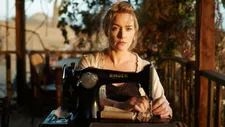 |
| Tilly Dunnage: "That's why I often refer to it as Unforgiven with a sewing machine." |
JM: Sounds like I should see that. I think it's a universal story. That's why I often refer to it as Unforgiven with a sewing machine. That's why I chose to use the western look. Especially spaghetti westerns by Sergio Leone, which were actually not shot in America. They took as their story lines the idea of a loner.
A mysterious stranger comes into town, usually with revenge on their mind. But I think it's a universal story. You go back to the place where you were injured and you punish the evil doers. It appeals to us as human beings.
AKT: Because it's closure?
JM: It's punishing those who caused harm. It's a sort of wish.
AKT: I never thought of that before - school reunions have some of that.
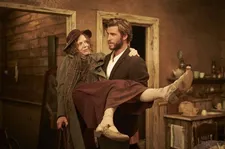 |
| Judy Davis as Molly with Teddy: "I just loved her through the camera. What a face! She is so expressive." |
JM: Yeah. I'm going to show them! Those bullies - I'm going to show them. I'm more successful than any of them.
SM: And the nice twist is that Tilly actually through her skills as a couture seamstress - she just makes it possible to lead their own undoing. It's their vanity that sets things in motion. It's a moral fable. It was them that caused the tragedy that forced her to leave the town in the first place. And it's the clothes that they literally become unstitched in the end.
AKT: James Bond has special weapons. She has a recipe by Alice B Toklas.
JM: Yes! I like to think she might have even met her in Paris when she was living there.
AKT: How did South Pacific come in?
JM: It's in the book. It was another thing to help audiences remember it was set in the Fifties. And I thought it was a really beautiful romantic piece of music.
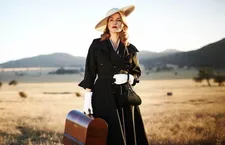 |
| Tilly Dunnage: "A mysterious stranger comes into town, usually with revenge on their mind." |
AKT: How close to the novel is the movie?
JM: It's very close. It's a different beast. A movie is not a book so we cut quite a few characters, quite a few events, combined some and rearranged a few things.
SM: It was actually Rosalie Ham's first novel. Like many first novels …
JM: … she threw everything in!
SM: There's many, many more subplots. Part of the artistry - what Jocelyn brought to it was to be able to weave this extraordinary story of excess of comedy and tragedy and to have a skeleton that's a very simple one. And that is a reconciliation between mother and daughter.
AKT: It has a bit of Grey Gardens to it.
JM: Definitely. I was inspired by that. She's in that crazy house and it's all overgrown and she [Molly] just lives in her little bedroom.
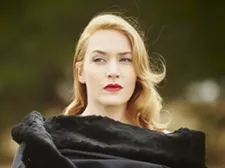 |
| "Those bullies - I'm going to show them. I'm more successful than any of them." |
AKT: It's very touching, too. You understand her somehow.
JM: She's been wounded badly.
SM: And the work that Kate and Judy do together is just beautiful. It's the first film that they ever worked together on. You can just see these two great actresses at the height of their power.
AKT: Am I correct that you, Sue, knew the novelist?
SM: We went to school together. We both came from the same tiny little town. But we had no contact for 30 years. So I've waited for the book for five years because I really really wanted to make this movie and then I really really wanted Jocelyn to direct this movie because she did this amazing first feature film called Proof which, like The Dressmaker, is deeply ironic.
AKT: You say you came from the same place, so you recognize all those people? The real real ones?
SM: Absolutely. They're not actually based on actual people but those types of characters are in every little town all over the world.
AKT: I liked the wild unpredictability. Silo jumping! And also nobody is safe. Anybody could be Janet Leigh at any time. It's interesting that the infidelity strand comes in so late in the plot.
JM: That's when you start to realize it was his doing because he wanted to hurt Molly. He couldn't have his son, he didn't want her to have her daughter. In a way, Pettyman (Shane Bourne) is the grand evil architect of all pain. That's why he deserves to go the way he does.
Read what Jocelyn Moorhouse and Sue Maslin had to say on consulting with Sophie Theallet about Madeleine Vionnet and Cristóbal Balenciaga, loving Billy Wilder, watching Sunset Boulevard, and entering a different world.
The Dressmaker opened in the US on September 23.





















